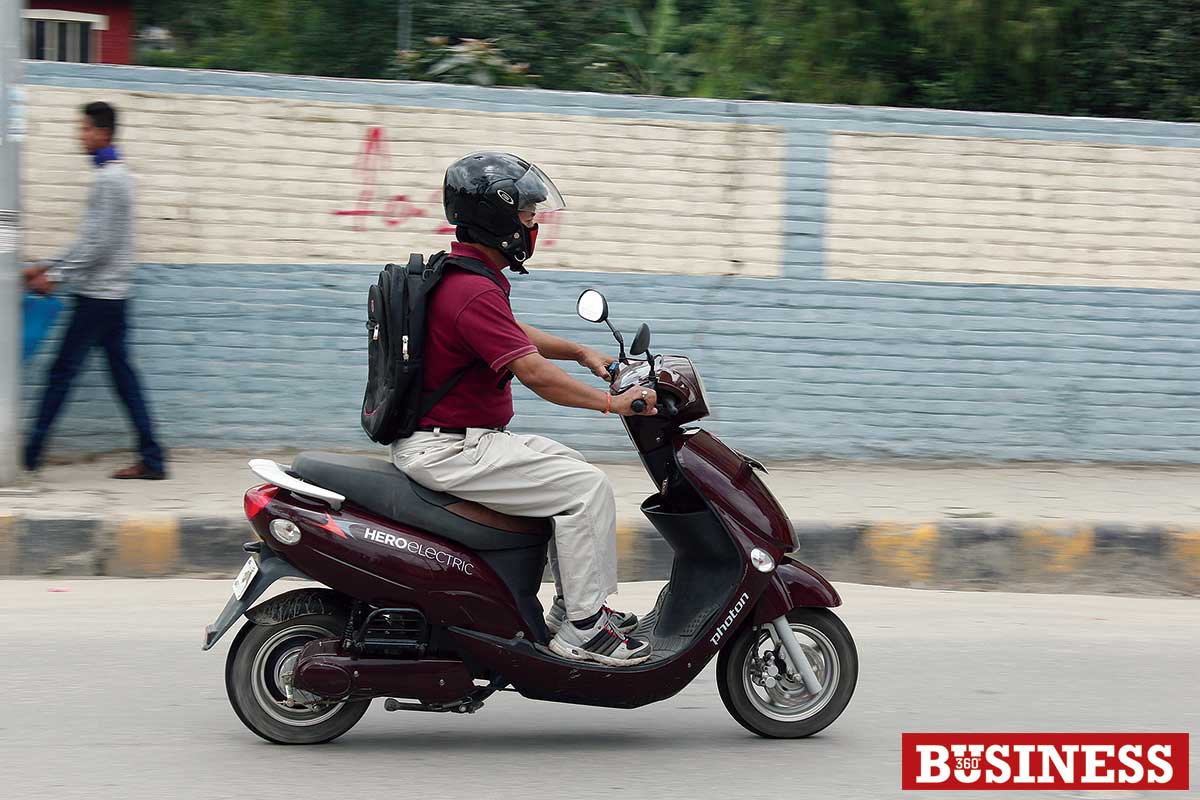
Despite the country mulling over promoting electric vehicles since long, nothing much has happened besides the private sector launching scooters and cars that run on alternative energy and a few development organisations commenceing campaigns to foster the use of electric vehilcles in a bid to help lower carbon emission. The government, on its parts has cut down on customs tariff, but many issues remain critical to the success of this industry.
The prolonged fuel crisis of last year taught people the significance of energy security for the overall development of the country. It came as an eye opener for policy makers and government to frame and execute policies to gradually minimise energy use, especially the issue of petroleum product dependency on other countries. Those lobbying for energy security policy termed the crisis a ‘blessing in disguise’.
The government’s move to reduce customs tariff on electric vehicles (EVs) in a significant manner has been considered as a policy departure in the transport sector. The government through the fiscal budget has lowered customs tariff of electric vehicles heavily. Along with enforcement of the new law, an electric car that used to cost around Rs 1.4 million previously now costs only around Rs one million, according to traders.
The fiscal budget 2016-17 has minimised customs tariff on big vehicles (bus, minibus) normally used for public transportation to one percent (of the total cost) from 30 percent earlier. Similarly, four wheelers for individual use like jeep, car, van needs to pay only 10 percent customs tariff from 30 percent of previous years. The government, however, has not revised customs tariff of electric scooters which was already 10 percent. The government also scrapped the provision of excise duty on electric vehicles since this fiscal. Apart from this, the electric vehicle owner should not have to pay vehicle tax and there is provision of 50 percent off on road maintenance tax. Petrol and diesel engine vehicles have to pay seven percent total cost as road maintenance tax. Here the government has extended a facility for electric vehicles which run on battery or directly from electricity like (trolley bus, tram among others).
What needs to be done further?
The government has reduced customs tariff of the electric vehicles in the aftermath of fuel crisis aiming at minimising dependency on transportation fuel. The country is entirely reliant on the southern neighbour for fuel. The problem of erratic power supply is expected to be addressed by next year as the 456 MW Upper Tamakoshi Hydropower Project and around 120 MW projects developed by independent power producers will be connected to the national grid. Electric vehicles are feasible in Nepal considering the additional electric energy being installed into the national power system. But we must take into consideration that the government is also planning to increase import of electricity to around 600 megawatt from India by next year. However, the government especially, the Ministry of Physical Infrastructure and Transport (MoPIT) and Department of Transport Management (DoTM) need to resolve crucial issues that are hindering the popularisation of EVs in Nepal. The Electric Vehicles Association of Nepal (EVAN) has submitted a report to the DoTM some nine months ago. The report has identified the route and potential number of EVs that can be permitted in Kathmandu valley, but the Department has not made any decision in this regard. On the other hand, the DoTM has created hassles in the registration of electric scooters that are imported in large quantities during the fuel crisis. “From these cases, we can easily understand that the DoTM is reluctant to promote electric vehicles in the country,” rues Umesh Raj Shrestha, President of the EVAN. As per a study of EVAN based on the current flow of vehicles and passengers, there is space for around 350 electric three wheelers, 200 buses in primary and secondary routes of the Kathmandu valley. Electric vehicles are not new in Nepal. The introduction of the trolley bus in 1975 as a model transportation met overwhelming success. The electric bus service was installed in Kathmandu valley from Tripureshwor (Kathmandu) to Surya Binayak (Bhaktapur) with financial support from the Government of China. The trolley bus service has been completely shut down for over half a decade. Use of electric vehicle is limited in the country. As per electric vehicle traders, electric cars that are in use in the country travel 120 kilometers in one charge and electric scooter travels around 60 to 80 kms in one charge. In Nepal mostly, REVA (Indian) and NEVI (Chinese) cars are in use. Sensing a wide scope, a Nepali company, Hulas Motors in Biratnagar, a subsidiary of Golchha Organisation is all set to launch an electric car named ‘Da vinci’. The company has fixed its price at Rs 1.4 million. As per EVAN, there are around 300 electric cars and 2,000 electric scooters in use currently.
Infrastructure Development
Though the government has reduced customs tariff, there is lack of basic factors to promote electric vehicles, like charging stations, regular supply of electricity in charging stations, battery exchange and battery disposal facility, among others. EVAN has proposed the government to develop charging and battery changing stations at Minbhawan, Kathmandu at the premises of Trolley bus office. EVAN proposed to develop the area as electric vehicle hub for the electric vehicle to preserve the country’s first electric vehicle station. The station, where the bigger electric vehicles can get charging and battery changing facility, will also encourage public transportation to run from electricity.
The DoTM first needs to issue route permit and manage the registration system of electric vehicles. But none of this has happened. Environment friendly electric vehicles are considered a sustainable means of transportation. Promotion of electric vehicles gradually minimises dependency upon fossil fuel. Innovation and new technology are being introduced in electric vehicles as developed countries are making shifts to these to minimise carbon emission. Advanced electric vehicles travel 500 kms in one charge. Lack of infrastructure in the country has been discouraging EV traders from increasing imports in the country. The government policy is also inconsistent, reason traders despite recent heavy reduction in customs tariff.
Unsettled debate
There is huge debate among policymakers whether to promote battery vehicles or not. Electric vehicles that run on battery are not a sustainable solution, according to Batu Krishna Uprety, environment conservation activist. “The country will face big problems in disposing the batteries in the medium term, if it promotes battery-run vehicles in a rampant manner.” The disposal of toxic lead from the battery concerns environmentalists and policy makers.
However,
officials at MoPIT disclose that the government has been preparing to obtain assistance from a German financial institution, KFW that proposed to set up battery maintenance and disposal factory. But environment conservation activists are not in agreement with the government promoting battery run electric vehicles.






